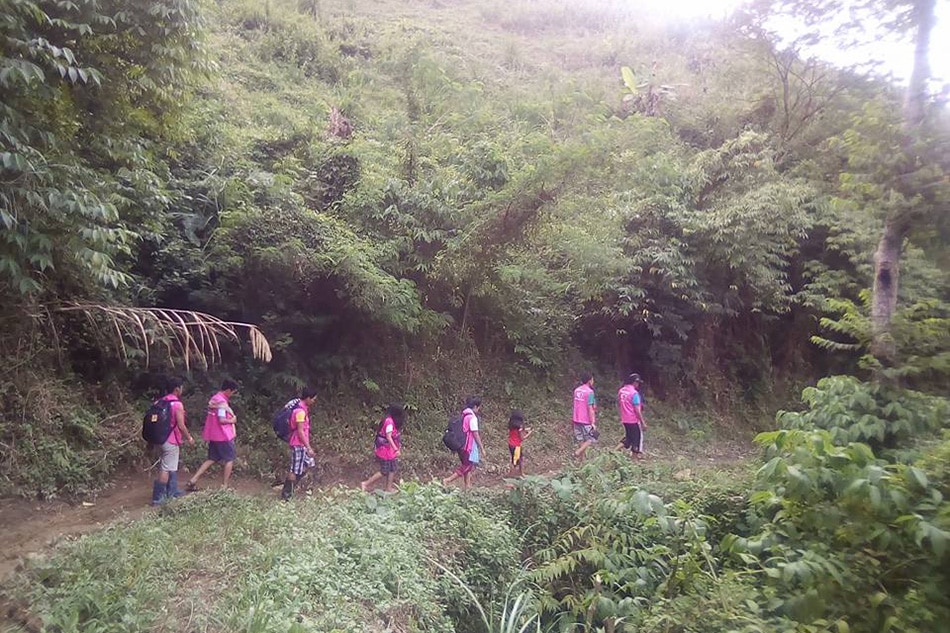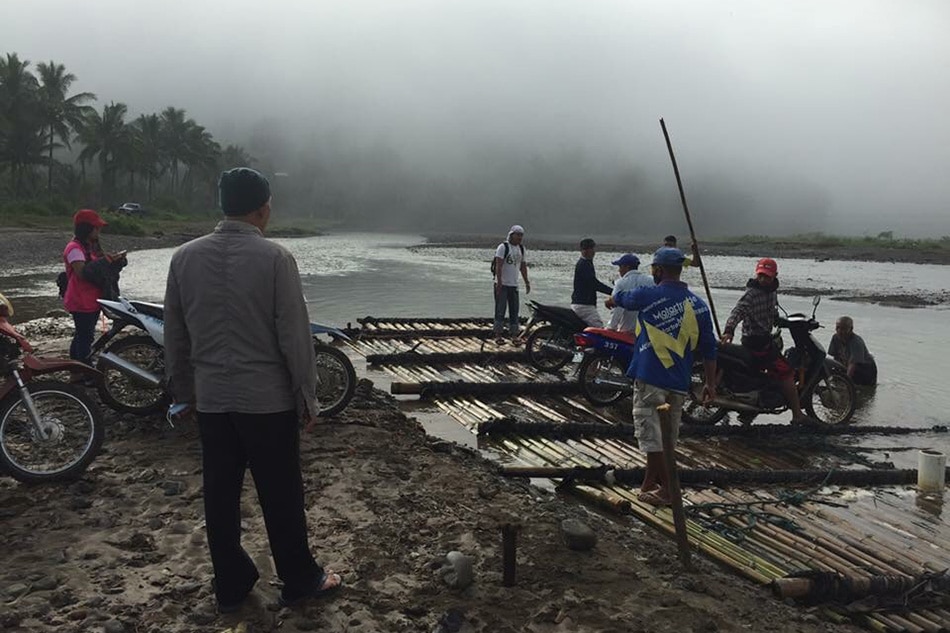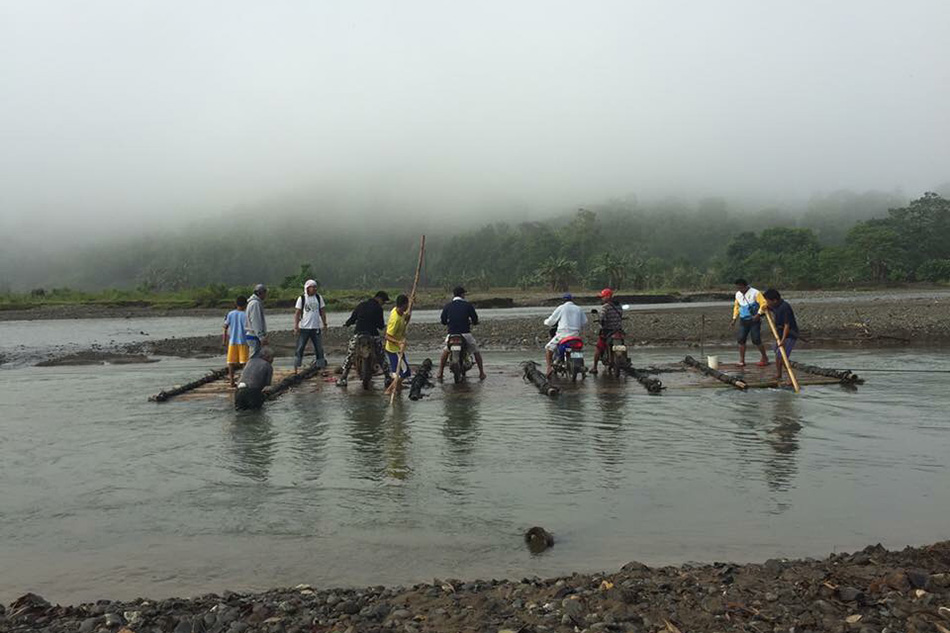Churches fan out to protect farmers from harassment | ABS-CBN

Welcome, Kapamilya! We use cookies to improve your browsing experience. Continuing to use this site means you agree to our use of cookies. Tell me more!
Churches fan out to protect farmers from harassment
Churches fan out to protect farmers from harassment
Inday Espina-Varona
Published Nov 28, 2017 02:56 PM PHT
|
Updated Dec 04, 2017 09:36 PM PHT
Second of two parts
Pink vests stood out in mid-November amid the lush, green walls of a Subanen hamlet in barangay Saad, Dumingag town, Zamboanga del Sur.
Pink vests stood out in mid-November amid the lush, green walls of a Subanen hamlet in barangay Saad, Dumingag town, Zamboanga del Sur.
As the small team of men and women struggled on the slopes of the mountain called Putok Marine, their guide said they were on the site that witnessed heavy fighting in the early 1980s between communist rebels and the late dictator Ferdinand Marcos’ military forcers.
As the small team of men and women struggled on the slopes of the mountain called Putok Marine, their guide said they were on the site that witnessed heavy fighting in the early 1980s between communist rebels and the late dictator Ferdinand Marcos’ military forcers.
The pink vests are trademarks of the Iglesia Filipina Independiente (IFI). For two years now, IFI clergy and lay volunteers have braved treacherous crossings and rugged mountain terrain to live with besieged indigenous peoples in Mindanao's conflict zones.
The pink vests are trademarks of the Iglesia Filipina Independiente (IFI). For two years now, IFI clergy and lay volunteers have braved treacherous crossings and rugged mountain terrain to live with besieged indigenous peoples in Mindanao's conflict zones.
The visit to the Subanen village represents the latest installment in a program that aims to gift IPs with the church’s “protective presence,” Fr. Christopher Ablon told ABS-CBN News.
The visit to the Subanen village represents the latest installment in a program that aims to gift IPs with the church’s “protective presence,” Fr. Christopher Ablon told ABS-CBN News.
ADVERTISEMENT
Ablon introduced the concept in the country after being inspired by a visit to Palestinian communities.
Ablon introduced the concept in the country after being inspired by a visit to Palestinian communities.
The program sets no faith requirement in targeting beneficiaries. Most of the host villages lack the most basic of social services, including power and water utilities, and access to health and education.
The program sets no faith requirement in targeting beneficiaries. Most of the host villages lack the most basic of social services, including power and water utilities, and access to health and education.
IFI church workers engage in “hunglos,” a term that spans the farming seasons, reflecting how indigenous folk work together, helping one farmer after another, from land preparation to planting, right through the harvest.
IFI church workers engage in “hunglos,” a term that spans the farming seasons, reflecting how indigenous folk work together, helping one farmer after another, from land preparation to planting, right through the harvest.
Love's harvest
The first mission involved 30 accompaniers who lived for a month in three Tindoga communities of the Manobo-Pulangihon tribe in Quezon town, Bukidnon province.
The first mission involved 30 accompaniers who lived for a month in three Tindoga communities of the Manobo-Pulangihon tribe in Quezon town, Bukidnon province.
Before their arrival, the hillside community of 107 families lost a big part of its harvest for 7 straight years to paramilitary forces hired by plantations resisting agrarian reform.
Before their arrival, the hillside community of 107 families lost a big part of its harvest for 7 straight years to paramilitary forces hired by plantations resisting agrarian reform.
Clergy and lay leaders actually worked the land, side by side with the hosts.
Clergy and lay leaders actually worked the land, side by side with the hosts.
“The faces of the Lumad after completion of a harvest without harassment erased any weariness the accompaniers felt,” Ablon said.
“The faces of the Lumad after completion of a harvest without harassment erased any weariness the accompaniers felt,” Ablon said.
In all its missions, IFI teams go around the borders of the communities on morning and afternoon walks, wearing the pink vests to proclaim their protection.
In all its missions, IFI teams go around the borders of the communities on morning and afternoon walks, wearing the pink vests to proclaim their protection.
The volunteers, trained in conflict resolution and reporting, also share their skills with local leaders even as they take part other dialy village tasks.
The volunteers, trained in conflict resolution and reporting, also share their skills with local leaders even as they take part other dialy village tasks.
Ablon stressed that the accompaniers do not take part directly in confrontations between hostile neighbors.
Ablon stressed that the accompaniers do not take part directly in confrontations between hostile neighbors.
“But their presence can cool down tempers and encourage some degree of cooperation from the hostile parties,” he told ABS-CBN News.
“But their presence can cool down tempers and encourage some degree of cooperation from the hostile parties,” he told ABS-CBN News.
Harvest season is not the only opportunity for protective presence.
Harvest season is not the only opportunity for protective presence.
"Different communities need it at different times and we will respond to their needs," Ablon said.
"Different communities need it at different times and we will respond to their needs," Ablon said.
The concept of accompaniment also goes beyond the prevention or reduction of violence, Ablon said.
The concept of accompaniment also goes beyond the prevention or reduction of violence, Ablon said.
“It means to walk with the Lumad and other indigenous groups in their journey towards self-determination,” joining mobilizations to get attention to their plight and lobbying local and national officials to rein in abusive private armies and military allies.
“It means to walk with the Lumad and other indigenous groups in their journey towards self-determination,” joining mobilizations to get attention to their plight and lobbying local and national officials to rein in abusive private armies and military allies.
Expansion
In October, IFI teams fanned out across other regions of Mindanao, including Zamboanga del Norte, another hot spot of unrest.
In October, IFI teams fanned out across other regions of Mindanao, including Zamboanga del Norte, another hot spot of unrest.
“We crossed four rivers 17 times in order to meet the Subanen Tribe in Bagumbayan Village, Sergio Osmena town,” Ablon told ABS-CBN News.
“We crossed four rivers 17 times in order to meet the Subanen Tribe in Bagumbayan Village, Sergio Osmena town,” Ablon told ABS-CBN News.
Volunteers visited five different indigenous villages for needs and risk assessment. Accompaniers are scheduled to arrive in the new host areas before yearend, Ablon said.
Volunteers visited five different indigenous villages for needs and risk assessment. Accompaniers are scheduled to arrive in the new host areas before yearend, Ablon said.
Also in November, anoter team trekked to Lumad communities around Tandag City, Surigao del Sur.
Also in November, anoter team trekked to Lumad communities around Tandag City, Surigao del Sur.
The IFI has also visited indigenous tribes in Palwan, a pristine group of islands now threatened by mining, forestry, coal energy plants and big tourism developers.
The IFI has also visited indigenous tribes in Palwan, a pristine group of islands now threatened by mining, forestry, coal energy plants and big tourism developers.
Ablon said the program will not end with the cessation of violence or threats.
Ablon said the program will not end with the cessation of violence or threats.
It takes inspiration from the Lumad of Surigao del Sur, who built thriving farming communities able to bounce back after mass displacement.
It takes inspiration from the Lumad of Surigao del Sur, who built thriving farming communities able to bounce back after mass displacement.
“We’re here for the long term,” Ablon said. “We’ll be planting and harvesting with them. We’ll be teaching skills and learning from our indigenous brethren about fighting for the right to live in dignity and freedom.”
“We’re here for the long term,” Ablon said. “We’ll be planting and harvesting with them. We’ll be teaching skills and learning from our indigenous brethren about fighting for the right to live in dignity and freedom.”
The IFI is no stranger to attacks by government agents.
The IFI is no stranger to attacks by government agents.
Bishop Carlo Morales was arrested on May 11 this year in the company of Rommel Salinas, the National Democratic Front’s peace consultant Western Mindanao. At the time of his arrest, peace talks were ongoing.
Bishop Carlo Morales was arrested on May 11 this year in the company of Rommel Salinas, the National Democratic Front’s peace consultant Western Mindanao. At the time of his arrest, peace talks were ongoing.
The IFI is involved in the peace talks, with a representative as independent observers. The church’s bishops have also stood as third party facilitators for several releases of soldiers and cops captured by the New People’s Army. #30
The IFI is involved in the peace talks, with a representative as independent observers. The church’s bishops have also stood as third party facilitators for several releases of soldiers and cops captured by the New People’s Army. #30
ADVERTISEMENT
ADVERTISEMENT




